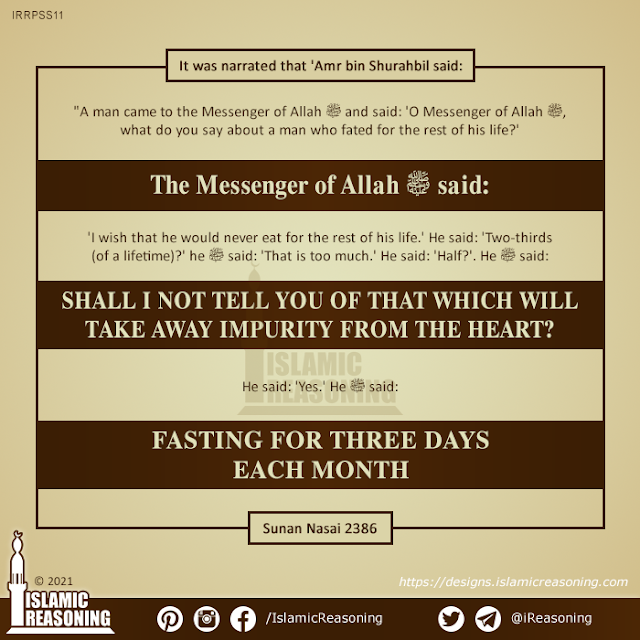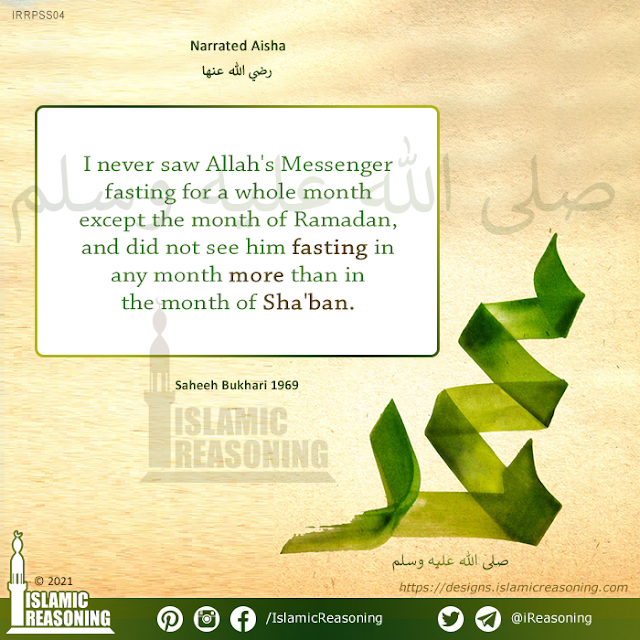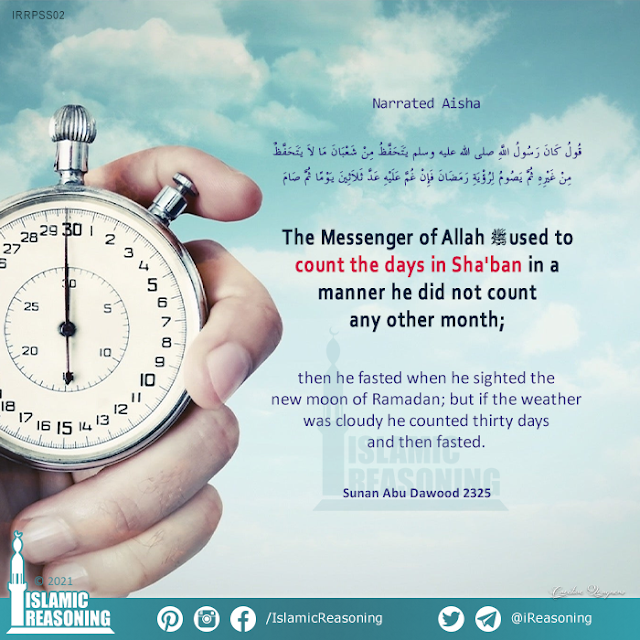It was narrated that 'Amr bin Shurahbil said:
"A man came to the Messenger of Allah and said: 'O Messenger of Allah, what do you say about a man who fated for the rest of his life?' The Messenger of Allah said: 'I wish that he would never eat for the rest of his life.' He said: 'Two-thirds ( of a lifetime)?' he said: 'That is too much.' He said: 'Half?' He said: 'Shall I not tell you of that which will take away impurity from the heart?' He said: 'Yes.' He said: 'Fasting for three days each month.' Ata said: 'someone who heard him told me that Ibn 'Umar (said) that the Prophet said: 'Whoever fasts every day of his life, then he has not fasted.''"
Ibn Rajab, may Allah have mercy on him, said:
“Fasting in Sha'baan is better than fasting in the Sacred Months*, and the best of voluntary fasts are those that are (observed in the months) closest to Ramadhaan, before or after. The status of these fasts is like that of al-Sunan al-Rawaatib which are done before and after Fardh (obligatory prayers) and which make up for any shortfall in the number of obligatory prayers. The same applies to fasts observed before and after Ramadhaan. Just as al-Sunan ar-Rawaatib are better than other kinds of voluntary prayers, so fasts observed (in the months) before and after Ramadhaan are better than fasts at other times.”
Reference: Lataa’if al-Ma’aarif fimaa li Mawaasim al-‘Aam min al-Wazaa’if, by Ibn Rajab al-Hanbali
Usamah bin Zaid said:
"I said: 'O Messenger of Allah, I do not see you fasting any month as much as 𝐒𝐡𝐚𝐛𝐚𝐧.' He said: '𝐓𝐡𝐚𝐭 𝐢𝐬 𝐚 𝐦𝐨𝐧𝐭𝐡 𝐭𝐨 𝐰𝐡𝐢𝐜𝐡 𝐩𝐞𝐨𝐩𝐥𝐞 𝐝𝐨 𝐧𝐨𝐭 𝐩𝐚𝐲 𝐦𝐮𝐜𝐡 𝐚𝐭𝐭𝐞𝐧𝐭𝐢𝐨𝐧, between Rajab and Ramadan. It is a month in which the deeds are taken up to the Lord of the worlds, and I like that my deeds be taken up when I am fasting."'

It was narrated that 'Aishah said:
"I would own fasts from Ramadan and I would not make them up until Shaban came."

It was narrated that 'Aishah said:
"The Messenger of Allah used to fast (all of) Shaban except a little."

It was narrated that Aishah said:
"One of us (women) would miss some fasts in Ramadan and she would not be able to make it up until Shaban began, and the Messenger of Allah did not fast in any month as he fasted in Shaban; he used to fast all of it, except a little, he used to fast all of it."
Narrated `Aisha:
Allah's Messenger (ﷺ) used to fast till one would say that he would never stop fasting, and he would abandon fasting till one would say that he would never fast. I never saw Allah's Messenger (ﷺ) fasting for a whole month except the month of Ramadan, and did not see him fasting in any month more than in the month of Sha'ban.

It was narrated from Umm Salamah:
𝐓𝐡𝐚𝐭 𝐭𝐡𝐞 𝐌𝐞𝐬𝐬𝐞𝐧𝐠𝐞𝐫 𝐨𝐟 𝐀𝐥𝐥𝐚𝐡 ﷺ 𝐰𝐨𝐮𝐥𝐝 𝐧𝐨𝐭 𝐟𝐚𝐬𝐭 𝐚𝐧𝐲 𝐭𝐰𝐨 𝐜𝐨𝐧𝐬𝐞𝐜𝐮𝐭𝐢𝐯𝐞 𝐦𝐨𝐧𝐭𝐡𝐬 𝐞𝐱𝐜𝐞𝐩𝐭 𝐒𝐡𝐚𝐛𝐚𝐧 𝐚𝐧𝐝 𝐑𝐚𝐦𝐚𝐝𝐚𝐧.
Usamah bin Zaid said:
"I said: 'O Messenger of Allah, I do not see you fasting any month as much as 𝐒𝐡𝐚𝐛𝐚𝐧.' He said: '𝐓𝐡𝐚𝐭 𝐢𝐬 𝐚 𝐦𝐨𝐧𝐭𝐡 𝐭𝐨 𝐰𝐡𝐢𝐜𝐡 𝐩𝐞𝐨𝐩𝐥𝐞 𝐝𝐨 𝐧𝐨𝐭 𝐩𝐚𝐲 𝐦𝐮𝐜𝐡 𝐚𝐭𝐭𝐞𝐧𝐭𝐢𝐨𝐧, between Rajab and Ramadan. It is a month in which the deeds are taken up to the Lord of the worlds, and I like that my deeds be taken up when I am fasting."'
Sahl bin Sa'd As-Sa'idi (May Allah be pleased with him) reported:
A man came to the Prophet (ﷺ) and said, "O Messenger of Allah, guide me to such an action which, if I do Allah will love me and the people will also love me." He (ﷺ) said, "Have no desire for this world, Allah will love you; and have no desire for what people possess, and the people will love you."
Abu Tha'labah Al-Khushani (May Allah be pleased with him) said:
The Messenger of Allah (ﷺ) said, "Allah, the Exalted, has laid down certain duties which you should not neglect, and has put certain limits which you should not transgress, and has kept silent about other matters out of mercy for you and not out of forgetfulness, so do not seek to investigate them."
On the authority of Muadh bin Jabal (may Allah be pleased with him) who said:
I said, “O Messenger of Allah, tell me of an act which will take me into Paradise and will keep me away from the Hellfire.” He (peace and blessings of Allah be upon him) said, “You have asked me about a great matter, yet it is easy for him for whom Allah makes it easy: worship Allah, without associating any partners with Him; establish the prayer; pay the zakat; fast in Ramadhan; and make the pilgrimage to the House.”
Then he (peace and blessings of Allah be upon him) said, “Shall I not guide you towards the means of goodness? Fasting is a shield; charity wipes away sin as water extinguishes fire; and the praying of a man in the depths of the night.” Then he (peace and blessings of Allah be upon him) recited: “[Those] who forsake their beds, to invoke their Lord in fear and hope, and they spend (charity in Allah’s cause) out of what We have bestowed on them. No person knows what is kept hidden for them of joy as a reward for what they used to do.” [as-Sajdah, 16-17]
Then he (peace and blessings of Allah be upon him) said, “Shall I not inform you of the head of the matter, its pillar and its peak?” I said, “Yes, O Messenger of Allah.” He (peace and blessings of Allah be upon him) said, “The head of the matter is Islam, its pillar is the prayer and its peak is jihad.” Then he (peace and blessings of Allah be upon him) said, “Shall I not tell you of the foundation of all of that?” I said, “Yes, O Messenger of Allah.” So he took hold of his tongue and said, “Restrain this.” I said, “O Prophet of Allah, will we be taken to account for what we say with it?” He (peace and blessings of Allah be upon him) said, “May your mother be bereaved of you, O Muadh! Is there anything that throws people into the Hellfire upon their faces — or: on their noses — except the harvests of their tongues?”
It was related by at-Tirmidhi, who said it was a good and sound hadeeth.




















